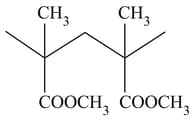Polymers and Polymerisation
Polymers and Polymerisation: Overview
In this topic, we will understand the meaning of polymers and polymerization in detail. It also deals with the classification of polymers into natural, semi-synthetic and synthetic polymers. Polymerisation reactions are also given here.
Important Questions on Polymers and Polymerisation
The process of formation of polymers from a mixture of two different unsaturated monomers is called
The most popular bone cement is a synthetic polymer having the fragment structure as given below.

The monomer(s) of the above polymer is/are
______ is the process by which monomers are transformed into a polymer.
The monomers used for the synthesis of Buna- are
Example of macromolecular colloids is
Which is not an example of condensation polymer?
Which of the following is/are biodegradable polymer(s)?
The repeating structural units of polymers are called _____.
Which of the following is the example for the natural macromolecule?
polymerisation of buta diene produces a polymer, which

The polymer obtained by the above compound is:
Which of the following properties do belong to polymers:
(a) Does not carry any charge.
(b) Has high viscosity.
(c) Scattering of light.
(d) Has low molecular weight.
On complete hydrogenation, natural rubber produces
What type of polymerisation takes place when a polyester is formed? Give one example of a polyester and name the monomers from which it is formed.
Following monomer are used to prepare polymer. Predict the structure of polymer.
Ethylene glycol.
Write the structures of monomers used in the preparation of following polymers.


